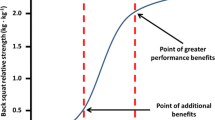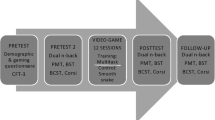Abstract
This study compared an individual, 4-hr intervention based on acceptance and commitment therapy (ACT) versus a no-contact control condition in improving the performance of international-level chess players. Five participants received the brief ACT protocol, with each matched to another chess player with similar characteristics in the control condition. Experimental participants showed significant reductions in the believability and interference of general, unpleasant private events during competitions as well as reductions in the frequency of the treated counterproductive reactions to private events (FCR). Also, as indicated by an objective chess performance measure (ELO performance), all participants in the experimental condition improved their performance during the 7 months after the ACT protocol in comparison to the 7 months prior; however, none of the control participants improved their chess performance. Pretreatment levels and initial changes in FCR and believability significantly predicted the effect sizes on chess performance in the experimental condition.
Similar content being viewed by others
References
BARNES-HOLMES, D., HAYES, S. C., & DYMOND, S. (2001). Self and self-directed rules. In S. C. Hayes, D. Barnes-Holmes, & B. Roche (Eds.), Relational frame theory. A post-Skinnerian account of human language and cognition (pp. 119–139). New York, NY: Plenum Press.
BERNIER, M., THIENOT, E., CODRON, R., & FOURNIER, J. F. (2009). Mindfulness and acceptance approaches in sport performance. Journal of Clinical Sport Psychology, 4, 320–333.
BOND, F. W., & FLAXMAN, P E. (2006). The ability of psychological fexibility and job control to predict learning, job performance, and mental health. Journal of Organizational Behavior Management, 26, 113–130. doi: 10.1300/J075v26n01_05
BOND, F. W., HAYES, S. C., BAER, R A., CARPENTER, K. M., GUENOLE, N., ORCUTT, H. K., ZETTLE, R D. (2011). Preliminary psychometric properties of the Acceptance and Action Questionnaire–Ii: A revised measure of psychological infexibility and experiential avoidance. Behavior Therapy, 42, 676–688. doi: 10.1016 /j.beth.2011.03.007
ELO, A. (1978). The rating of chess players, past and present. New York, NY: Arco.
FERNÁNDEZ, R., SECADES, R., TERRADOS, N., GARCÍA, E., & GARCÍA, J. M. (2004). Efecto de la hipnosis y de la terapia de aceptación y compromiso (Act) en la mejora de la fuerza física en piragüistas [Effect of hypnosis and acceptance and commitment therapy (Act) in improving canoeists’ physical strength]. International Journal of Clinical and Health Psychology, 4, 481–493.
GARDNER, F. L. (2009). Effcacy, mechanisms of change, and the scientifc development of sport psychology. Journal of Clinical Sport Psychology, 3, 139–155.
GARDNER, F. L., & MOORE, Z. E. (2004). A mindfulness-acceptance-commitment-based approach to athletic performance enhancement: Theoretical considerations. Behavior Therapy, 35, 707–723. doi: 10.1016/S0005-7894(04)80016-9
GARDNER, F. L., & MOORE, Z. E. (2006). Clinical sport psychology. Champaign, IL: Human Kinetics.
GARDNER, F. L., & MOORE, Z. E. (2007). The psychology of enhancing human performance. The mindfulness-acceptance-commitment (Mac) approach. New York, NY: Springer.
GIFFORD, E V., KOHLENBERG, B. S., HAYES, S. C., ANTONUCCIO, D. O., PIASECKI, M. M., RASMUSSEN-HALL, M. L., & PALM, K. M. (2004). Acceptance theory-based treatment for smoking cessation: An initial trial of acceptance and commitment therapy. Behavior Therapy, 35, 689–706. doi: 10.1016/S0005-7894(04)80015-7
GOODING, A., & GARDNER, F. L. (2009). An investigation of the relationship between mindfulness, preshot routine, and basketball free throw percentage. Journal of Clinical Sport Psychology, 4, 303–319.
GREGG, J. A., CALLAGHAN, G. M., HAYES, S. C., & GLENN-LAWSON, J. L. (2007). Improving diabetes self-management through acceptance, mindfulness, and values: A randomized controlled trial. Journal of Consulting and Clinical Psychology, 75, 336–343. doi: 10.1037/0022-006x.75.2.336
GUTIÉRREZ, O., LUCIANO, C., RODRÍGUEZ, M., & FINK, B. (2004). Comparison between an acceptance-based and a cognitive-control-based protocol for coping with pain. Behavior Therapy, 35, 767–783. doi: 10.1016/S0005-7894(04)80019-4
HARDY, L., JONES, G., & GOULD, D. (1996). Understanding psychological preparation for sport: Theory and practice of elite performers. New York, NY: John Wiley & Sons.
HAYES, S. C., BARNES-HOLMES, D., & ROCHE, B. (Eds.). (2001). Relational frame theory. A post-skinnerian account of human language and cognition. New York, NY: John Wiley & Sons.
HAYES, S. C., LUOMA, J. B., BOND, F., MASUDA, A., & LILLIS, J. (2006). Acceptance and commitment therapy: Model, processes and outcomes. Behavior Research and Therapy, 44, 1–25. doi: 10.1016/j.brat.2005.06.006
HAYES, S. C., & STROSAHL, K. d. (2004). A practical guide to acceptance and commitment therapy. New York, NY: Springer-Verlag.
HAYES, S. C., STROSAHL, K. d., & WILSON, K. G. (1999). Acceptance and commitment therapy. An experiential approach to behavior change. New York, NY: Guilford.
HAYES, S. C., WILSON, K. G., GIFFORD, E. V., FOLLETTE, V. M., & STROSAHL, K. D. (1996). Experiential avoidance and behavioral disorders: A functional dimensional approach to diagnosis and treatment. Journal of Consulting and Clinical Psychology, 64, 1152–1168. doi: 10.1037/0022-006x.64.6.1152
KRÍZ, M., VOKÁL, E., & KRÍZOVÁ, M. (1990). odraz psychického zatazenia na niektoré somatické a biochemické parametre u atypického sportového odvetvia [The impact of psychological stress on somatic and biochemical parameters in an atypical sports discipline]. Ceskoslovenske Zdravotnictvi, 11, 479–485.
KROGIUS, N. V. (1972). La psicología en ajedrez [The psychology of chess]. Barcelona, Spain: Martínez Roca.
LÓPEZ, J. C., RUIZ, F. J., FEDER, J., BARBERO-RUBIO, A., SUÁREZ-AGUIRRE, J. J., RODRÍGUEZ, J. A., & LUCIANO, C. (2010). The role of experiential avoidance in the performance on a high cognitive demand task. International Journal of Psychology and Psychological Therapy, 10, 475–488.
LUCIANO, C., & HAYES, S. C. (2001). Trastorno de evitación experiencial [Experiential avoidance disorder]. International Journal of Clinical and Health Psychology, 1, 109–157.
LUCIANO, C., RODRÍGUEZ, M., & GUTIÉRREZ, O (2004). A proposal for synthesizing verbal context in experiential avoidance disorder and acceptance and commitment therapy. International Journal of Psychology and Psychological Therapy, 4, 377–394.
LUCIANO, C., VALDIVIA-SALAS, S., GUTIÉRREZ-MARTÍNEZ, O., RUIZ, F. J., & PÁEZ-BLARRINA, M. (2009). Brief acceptance-based protocols applied to the work with adolescents. International Journal of Psychology and Psychological Therapy, 9, 237–257.
LUTKENHOUSE, J. M. (2007). The case of Jenny: A freshman collegiate athlete experiencing performance dysfunction. Journal of Clinical Sport Psychology, 1, 166–180.
MARTIN, G. L., VAUSE, T., & SCHWARZMAN, L. (2005). Experimental studies of psychological interventions with athletes in competitions. Why so few? Behavior Modifcation, 29, 616–641. doi: 10.1177/0145445503259394
MCCRACKEN, L. M., VOWLES, K. E., & ECCLESTON, C. (2004). Acceptance of chronic pain: Component anlaysis and revised assessment method. Pain, 107, 159–166. doi: 10.1016/j.pain.2003.10.012
NUNN, J. (1998). Secrets of practical chess. London, England: Gambit.
PFLEGER, H., STOCKER, K., PABST, H., & HARALAMBIE, G. (1980). Sportmedizinische untersuchung an schachspierlern der spitzenklasse [Sports medical examination of top class chess players]. Munchener Medizinische Wochenschrift, 28, 1041–1044.
ROWSON, J. (2000). The seven deadly chess sins. London, England: Gambit.
RUIZ, F. J. (2006). Aplicación de la terapia de aceptación y compromiso (Act) para el incremento del rendimiento ajedrecístico. Un estudio de caso [Application of acceptance and commitment therapy (Act) for improving chess performance. A case study]. International Journal of Psychology and Psychological Therapy, 6, 77–97.
RUIZ, F. J. (2010). A review of acceptance and commitment therapy (Act) empirical evidence: Correlational, experimental psychopathology, component and outcome studies. International Journal of Psychology and Psychological Therapy, 10, 125–162.
RUIZ, F. J., LANGER, A. I., LUCIANO, C., CANGAS, A. J., & BELTRÁN, I (in press). Measuring experiential avoidance and psychological infexibility: the Spanish translation of the Acceptance and Action Questionnaire–II. Psicothema.
RUIZ, F. J., & LUCIANO, C. (2009). Efcacia de la terapia de aceptación y compromiso (Act) en la mejora del rendimiento ajedrecístico de jóvenes promesas [Acceptance and commitment therapy (Act) and improving chess performance in promising young chess players]. Psicothema, 21, 347–352.
SCHWANH AUSSER, L. (2009). Application of the mindfulness-acceptance-commitment (Mac) protocol with an adolescent springboard diver. Journal of Clinical Sport Psychology, 4, 377–395.
WHELAN, J., MAHONEY, M., & MEYERS, A. (1991). Performance enhancement in sport: A cognitive-behavioral domain. Behavior Therapy, 22, 307–327. doi: 10.1016 /S0 005-7894 (05)8 0369-7
WILSON, K. G., & LUCIANO, M. C. (2002). Terapia de aceptación y compromiso (Act). Un tratamiento conductual orientado a los valores [Acceptance and commitment therapy (Act). A behavioral treatment oriented to personal values]. Madrid, Spain: Pirámide.
ZETTLE, R D., PETERSEN, C. L., HOCKER, T R., & PROVINES, J. L. (2007). Responding to a challenging perceptual-motor task as a function of level of experiential avoidance. The Psychological Record, 57, 49–62.
Author information
Authors and Affiliations
Corresponding author
Additional information
This research was partially supported with I+D+i funds from Ministerio de Educación y Ciencia, Spain (SEJ05845), and Junta de Andalucía, Spain (Research Group HUM-1093).
Rights and permissions
About this article
Cite this article
Ruiz, F.J., Luciano, C. Improving International-Level Chess Players’ Performance with an Acceptance-Based Protocol: Preliminary Findings. Psychol Rec 62, 447–462 (2012). https://doi.org/10.1007/BF03395813
Published:
Issue Date:
DOI: https://doi.org/10.1007/BF03395813




